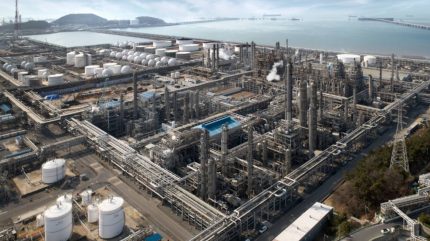
LG Chem and Enilive, a subsidiary of Eni, have commenced construction on South Korea’s reportedly inaugural hydrotreated vegetable oil (HVO) and sustainable aviation fuel (SAF) production facility.
The plant is located within LG Chem’s Daesan Chemical Complex in Seosan, Chungcheongnam-do, approximately 80km south-west of capital Seoul.

Discover B2B Marketing That Performs
Combine business intelligence and editorial excellence to reach engaged professionals across 36 leading media platforms.
The joint venture, LG-Eni BioRefining, is overseeing the project, which aims for completion by 2027. Upon completion, the facility will process around 400,000 tons (t) of renewable bio-feedstock annually.
The demand for HVO and SAF is anticipated to increase due to global renewable fuel mandates. The fuels are produced by hydrogenating sustainable vegetable oils such as used cooking oil and other waste residues, using Ecofining technology developed by Eni in collaboration with Honeywell UOP.
Compared to traditional fossil fuels, HVO and SAF significantly reduce greenhouse gas emissions across the entire product value chain.
LG Chem CEO Shin Hak-cheol said: “LG Chem is transforming its portfolio to build a low-carbon foundation that ensures both a progressively more sustainable growth and profitability.

US Tariffs are shifting - will you react or anticipate?
Don’t let policy changes catch you off guard. Stay proactive with real-time data and expert analysis.
By GlobalData“By advancing innovation in renewable fuels and biobased feedstocks like HVO, we aim to strengthen our global competitiveness and meet our customers’ evolving needs efficiently.”
The establishment of this facility marks a significant move for LG Chem in the renewable energy sector. By integrating HVO into its supply chain, the company aims to broaden its range of International Sustainability and Carbon Certification PLUS-certified products.
These products target applications in various sectors, including acrylonitrile butadiene styrene for electronics and cars, ethylene-vinyl acetate for sporting goods, and superabsorbent polymers for hygiene products.
Enilive CEO Stefano Ballista said: “The Seosan biorefinery breaking ground reaffirms Enilive’s strategy in offering increasingly sustainable products and our company’s position as a leader in biofuels production.
“Together with the plants that are already operational in Italy and in the US, and with new biorefining plants under construction in Italy and Malaysia, the upcoming biorefining plant in Daesan will contribute to reach our 2030 target to increase our biorefining capacity to over five million tons per year, with the potential to produce more than two million tons per year of SAF.”



